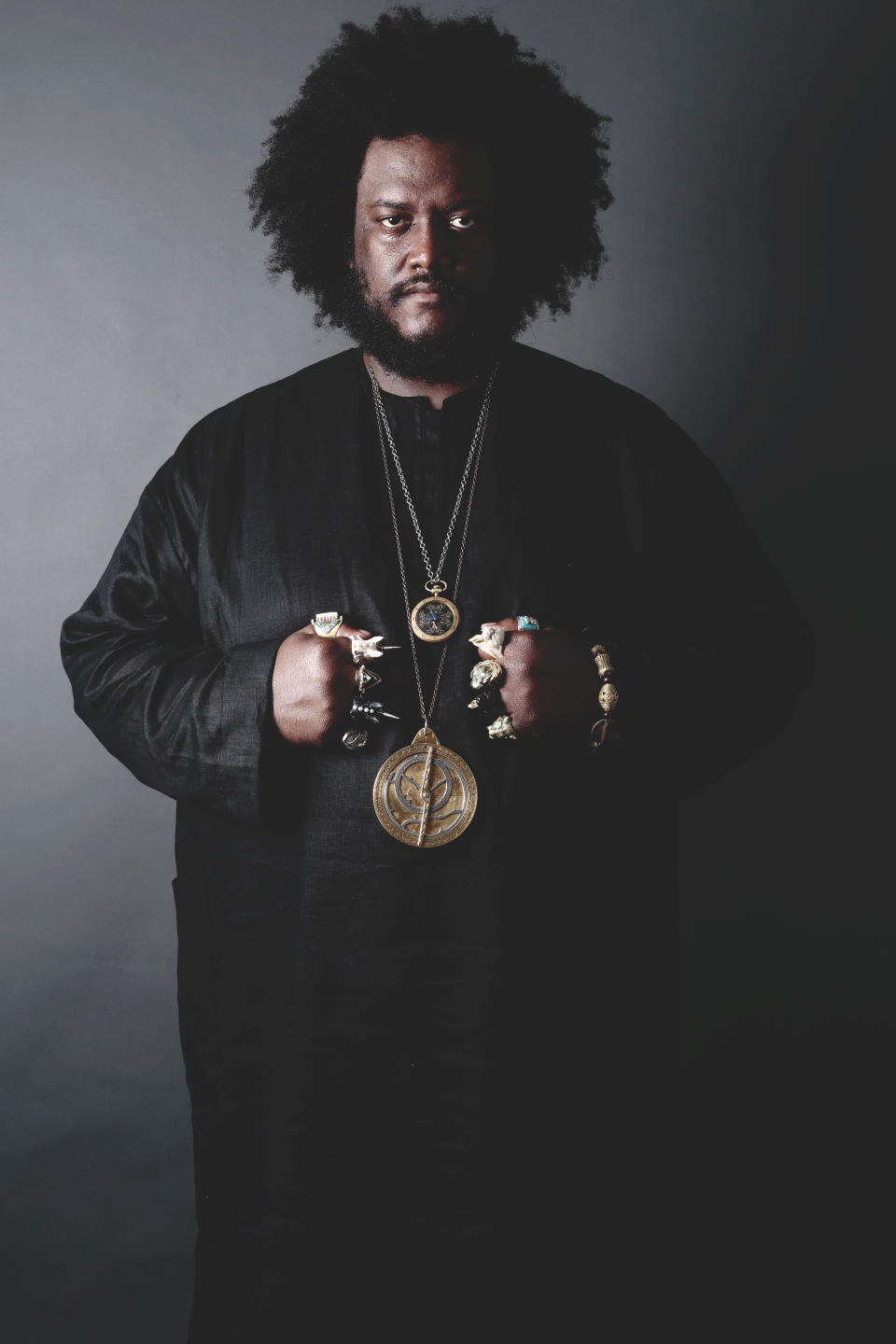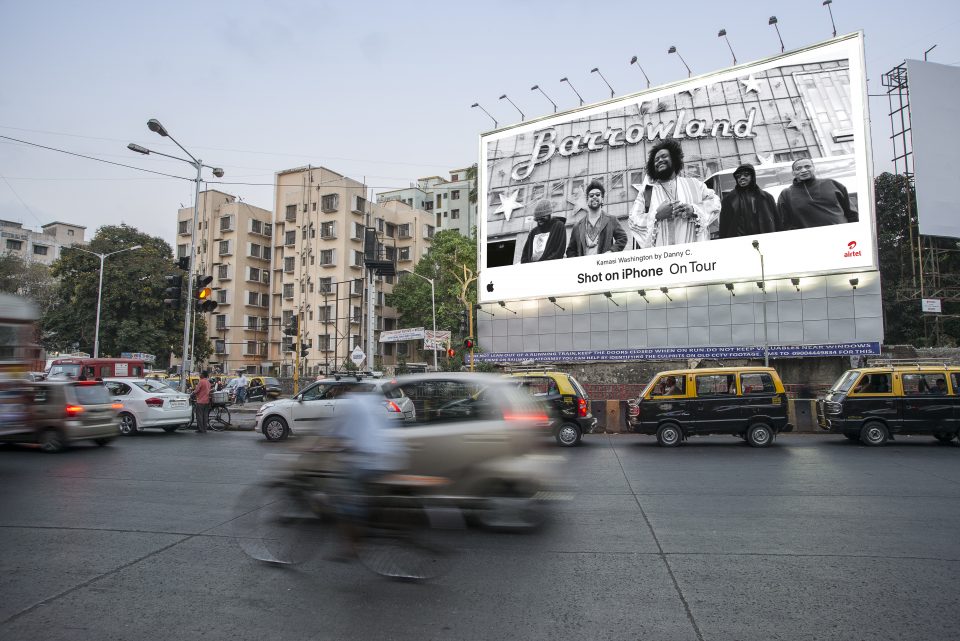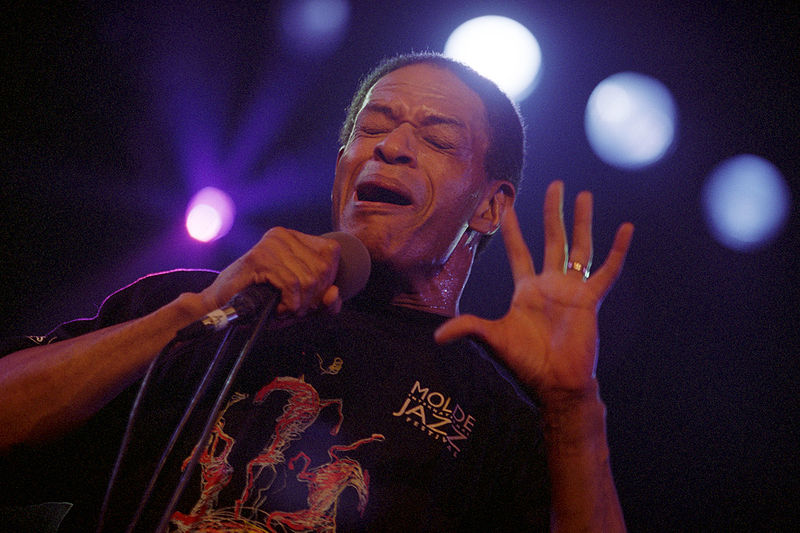Kamasi Washington on Black Lives Matter, Sneaking Into the Hollywood Bowl, Kendrick Lamar and More
The American saxophonist is in India for two shows in Mumbai and New Delhi
Catching up with Kamasi Washington was as delightful as it could get. As much as the American tenor saxophonist loves bringing the house down with his incomparable skills – whether it’s working with rapper Kendrick Lamar or performing with legendary pianist Herbie Hancock – when you sit down with him he is soft-spoken, relaxed and exudes warmth and positivity.
After just completing a North America tour run with Hancock, Washington is now currently in India for the first time to play two sold-out shows in the country along with his band, courtesy of Mumbai event and artist agency Third Culture.
We attended his Mumbai gig last night at The Royal Opera House where he performed tracks off albums such as The Epic and Heaven and Earth, putting on quite the stellar performance with sizzling sax solos accompanied by a thumping backing band which included his father Rickey on flute, bassist Miles Mosley, drummers Ronald Bruner Jr. and Tony Austin, trombone player Ryan Porter, pianist Mayasuki Hirano aka Big Yuki and vocalist Patrice Quinn. Washington will perform at New Delhi’s Oddbird Theatre tonight.
Growing up in Los Angeles, Washington always had music around him because of his musician father Rickey. “I was kind of born into it,” he says. “I remember the first album I ever bought was an N.W.A. tape, I had to hide it from my parents because they wouldn’t let me have it,” the saxophonist says with a laugh. Since Washington had plenty of records at his house, he states that he went on to influence jazz to other kids in South Central L.A. He explains, “There was this one school where everybody was into The Jazz Messengers because I showed them that a Tribe Called Quest sample came from the Jazz Messengers and they just liked that.”
In this interview with Rolling Stone India, Washington opens up about his own music, sneaking into the Hollywood Bowl when he was younger, working with Kendrick Lamar, being the jazz voice of the Black Lives Matter Movement and more. Excerpts:

“Coltrane has definitely been the biggest influence musically for me,” says Washington. Photo: Courtesy of the artist
You’ve finished a run of gigs with Herbie Hancock – what was that experience like for you?
One of the most amazing experiences of my life. I grew up listening to Herbie. You know that band that he played in with Miles [Davis] and all his own records. I was very much aware of his past and I was aware of his present as well but to play music with him every night and to see him every night still reaching, still pushing further, still growing. He’s almost 80 years old, it made me kind of really understand how infinite music is. I heard him every night and I was like, this is someone who has done so much for music already and he’s still pushing it. He’s further than he’s ever been. Who does that at 80? Or 79? It was super inspiring; he’s such a beautiful person too and is still willing to share his wisdom, his understanding, all the stories and all that kind of stuff.
Miles Davis’ Kind of Blue recently completed its 60th anniversary and one of your biggest influences, John Coltrane, played on that record. Tell me about how Coltrane impacted your life.
Coltrane has definitely been the biggest influence musically for me. He wasn’t my first influence but he was definitely my biggest influence. Art Blakey and the Jazz Messengers were like my first. My dad had been trying to get me into John Coltrane the whole time but it was too heavy for me when I was younger. I was like 11, I didn’t understand it. When I was 15 I got this record called Transition. I already liked John Coltrane at that point from records like Kind of Blue and the stuff he did with Miles. Some of his early records like Giant Steps; I was already a fan because of that. When I got Transition it was like, ‘Oh wow, I get it now.’ His music is very powerful and it, like, hits you in the chest when you open to it. It kind of made me rethink about how powerful music is. It was like hitting me in the heart. It kind of made me want to play music in that way like really from the heart.
People like yourself, Esperanza Spalding, Thundercat, Trombone Shorty are keeping jazz alive and sort of reviving it. Do you see yourself as a torchbearer for the genre?
Yeah, I know that I am. Genres are an interesting thing. I feel like music is more personal than genre sometimes represents. In the end each musician really represents themselves. They represent their work. You listen to Freddie Hubbard; you wouldn’t say that he represents John Coltrane. John Coltrane represents John Coltrane. Freddie Hubbard represents Freddie Hubbard. The Beatles represent The Beatles and the Rolling Stones represent the Rolling Stones. With that people are also very connected. So genres are like that connection. To me, jazz genre is so wide and so many avenues, but yeah the idea of being a torchbearer is good. I feel like we’re bringing people back to that genre, bringing people to a place where they are open to that music. It felt like for a while people had become closed to it, so in that sense a torch like how a fire brings moths, we bring people to the music. People like myself, Esperanza, Terence Martin, Thundercat. We’re all bringing people to this music and once they start their journey they will eventually find all these other beautiful gems of this music.
I read that you are the jazz voice of the Black Lives Matter Movement – what do you make of that line?
Yeah I understand what it’s saying. The idea of Black Lives Matter is something that as a black man, kind of a big dark skinned black man I have felt my entire life. The notion that somehow just because of the way I look, my size and my skin complexion, my life is in danger. Not from a criminal but from the police, the people who are meant to protect us. My life is in danger and I grew up with that fear. I grew up with the fear of like ‘be careful of the police.’ In that notion that like, they feel like it’s okay. A police officer sees someone, makes a false judgment upon them just based of the way they look and takes their life, makes you feel like your life is not very valuable. When society then sees that, that police officer goes to court and the court says he didn’t do anything wrong, he’s innocent, that further makes you feel like my life doesn’t mean anything. You take it just because of the way I look. So the idea of Black Lives Matter, understanding that our lives matter, you can’t just take them frivolously and unjustly like that. So that representation to me is like I’m an example of that. To say that you can take somebody’s life because of the way that they look? I’ve never committed a crime in my life. I’m not a threat to anyone. So you shouldn’t be able to take my life. I look just like this other person whose life you took, so that notion because I look this way you can take my life, no.

Washington says on Black Lives Matter, “That notion because I look this way you can take my life, no.”
I always tell people sometimes it’s harder for people to understand that. I tell people that what if all of a sudden there was a notion that people who were under six feet tall were dangerous? Police officers would just kill someone because they were under six feet tall. That’s ridiculous. There have been cases where there is video evidence of a man getting shot in his car and the person saying, ‘I thought he was dangerous.’ Why’d you think he was dangerous? What gave you that idea? Why is it that you feel like you can just take someone’s life because you think they’re dangerous cause of the way they look? It’s like, ‘Yeah ‘cause of the color of his skin.’ As a society we have accepted that notion that these people who look like this are dangerous. Through my music I try to express my experience of my life and try to put that into the music. It has been my experience since I was a kid. At 11 or 12 years old I was already like almost six feet tall and I’d see a police officer you’d think I’d be like, ‘Oh I’m safe it’s a cop,’ but I was scared.
You’ve worked with everyone from Snoop Dogg to Chaka Khan, how do you adapt to playing with different artists?
I try to understand what they’re searching for. The best way to kind of adapt is to come in without a preconceived notion. So I come in with a blank slate, I try to listen to it, I listen to what they say and then I try to see how I can contribute. The best way to fit in with anyone is to show up to every situation without a preconceived notion. Which is hard because we always have thoughts. I remember when I worked with Kendrick [Lamar], I came in and he was like, ‘Do whatever you want to do.’ I’ve made a lot of records before that and I am so used to, as a musician, hiding the cool stuff that you’re going to do. People will ask you to do this one little small thing and you’re like ‘Man but I can give you something so much more beautiful.’ You want to put those beautiful things because you love music so you learn ways to sneak it in there. And he was like, ‘You don’t need to sneak it in there, you can go all the way.’ It took me a minute where I was like; ‘I can go all the way?’ I can hear it in the music, I can hear Thundercat going all the way, I can hear all the musicians that were already on the record going all the way.
My next question was going to be about Kendrick Lamar and what it was like for you to work on his record To Pimp a Butterfly.
It was great; Kendrick is a real brilliant, brilliant, brilliant man. They were pretty far along that record before I came in. I remember hearing it and being like wow. To have someone hand you something that’s so beautiful and say do what you want to do, it’s an experience where it was fun but it was also like, ‘Don’t fuck it up.’ Because it was already so great. It was a great experience, it was very open and it was inspiring for me because it was so different from Good Kid, M.A.A.D City and to have a record that was that successful and that dope and for your next record to go in such a different direction that’s rare. Not a lot of artists do that. That’s some pretty honest artistry. It was definitely something that I learned from and very proud to contribute.

Washington and his band live at the Apollo Theater in New York. Photo: Mary Kang
Your own albums, The Epic and Heaven and Earth have gone on to become highly successful. What do you put that success down to?
Music is an interesting thing, it’s such an expression and you never know what people are going to understand or be able to accept. It’s hard for me to really know why the albums are successful. Other than I can just say that I poured my whole heart and made them to be representations of who I am. I feel like honest music is always the music that really touches people the most. But the most honest answer I can give you is I don’t know (laughs).
Tell me about the inspiration behind your short film As Told To G/D Thyself which came out on Apple Music.
It was a collaboration between myself, Bradford Young and Terrence Nance. It’s one of those things, I met Bradford Young back when Epic came out. I was a fan of his work and he was a fan of my work. We just hit it off. I felt like we had a kindred spirits kind of thing. I also met Terence Nance and It was the same thing. I met these amazing artists whose craft was a different form but it felt like we were coming from the same place. We got to talking and it was one of those things that was a very natural process of understanding what it was like.
The album happens in three parts and it turned into a fourth part of the record. More so than just being a visual representation of what the album was it turned into another part of the record. So we had this vision that was really kind of big and crazy and were really fortunate to have. That’s when we started talking to Apple. That’s always the hard part, the budget. Having a partner who has the budget and is also willing to let you do what you want to do it really turned into something more that what I thought.

A billboard of Washington in Mumbai promoting his ‘On Tour’ campaign shot on iPhone. Photo: Courtesy of Apple
What’s one moment that stands out for you in your career so far?
There are so many, I’m going to give you a couple. One of them is when I did the album release party for The Epic, I made that record in 2011 and I had this premonition that God was telling me that this record was going to do really well. But then it took a long time so I was like I don’t know. That night when it came out and all these people at the show and all these musicians on stage and just this energy that was there. I remember walking on stage and being blown away by it. It took so long to do this and I was like put everything I had, all my money, all my music – it was like everything I had I put into this thing. In that moment of walking out on stage and seeing it, it was like the doors open. Doors that had been closed to me my whole career. To really be able to go out and play my own music and express who I am not just help other people express who they are. That was a moment where I saw that door had been opened for me.
…Definitely the first time I played with Herbie Hancock. I played at Disney Hall. I remember kind of being up there with him and thinking like I’ve listened to so many of your records. If I went back in time to my 12 year old self practicing all day listening to records and say, ‘Man one day you’re going to play with Herbie Hancock.’ I probably wouldn’t have believed myself.
The first time I played at the Hollywood Bowl. I remember I used to sneak into the Hollywood Bowl ‘cause I didn’t have any money. Me and my friend Ronald, we used to sneak into the Hollywood Bowl all the time. There was this little route that we knew, we’d take our instruments, we’ll go into this little back way and I remember wow I used to sneak in here to hear concerts and now I’m playing on that same stage. Life is like that, if you put in you never really know what’s going to come out.
What’s next once this tour cycle wraps up?
I have some ideas for a record. I’m also working on this graphic novel. It’s kind of like the thing that’s most pressing on my mind. I just need to sit down somewhere and put it down. Also listen to a lot of music; I’m also inspired after playing with Herbie. I feel like I poured so much of myself into Heaven and Earth I needed to find another part of me to pull something out. I don’t know exactly what I’ll do next but I can kind of see it on the horizon. But yeah I think the graphic novel, it’s first in line right now but you never know something can come along and cut the line (laughs).





